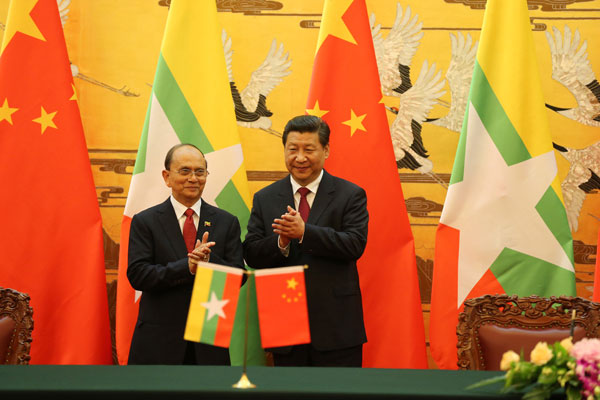Myanmar leader hails ties
By LI XIAOKUN (China Daily) Updated: 2014-06-28 04:38
 |
|
President Xi Jinping and Myanmar President U Thein Sein attend a signing ceremony at the Great Hall of the People in Beijing on Friday. [Xu jingxing / CHINA daily] |
|
"China expects to see long-term stability and development in Myanmar." Xi Jinping President |
Observers said the trip by U Thein Sein reflects Myanmar's determination to see stronger ties with Beijing.
"Myanmar appreciates China's support and assistance that has lasted for a long time and will continue to support China in its core interests and major concerns," Thein Sein told President Xi Jinping when they met at the Great Hall of the People.
Thein Sein also said Chinese enterprises are welcome to invest in Myanmar.
Reports have said that Chinese investment is not as welcome in Myanmar as previously, while some major projects have been interrupted. Chinese investment in the country dropped sharply in 2013.
But the authorities in Myanmar have denied any changes to policies on Chinese investment.
Xi told his visitor, "This is your fifth visit to China and your third state visit here since you became president," adding that this fully reflects the high importance Thein Sein attaches to Myanmar's ties with China.
Thein Sein took office in March 2011, winning his country's first elections in 20 years after military rule. Myanmar has since significantly improved its ties with the United States, European countries and some Asian nations, including Japan.
"China expects to see long-term stability and development in Myanmar," Xi said, adding that Beijing is firm about developing friendly ties with the country. The policy will not change with time or change due to any incidents, Xi said.
On Saturday and Sunday, Thein Sein will attend activities marking the 60th anniversary of the Five Principles of Peaceful Coexistence with Xi, Premier Li Keqiang and Indian Vice-President Mohammad Hamid Ansari.
In 1954, the leaders of China, India and Myanmar launched the Five Principles of Peaceful Coexistence.
The principles govern relations between states, including mutual respect for sovereignty and territorial integrity, mutual non-aggression, non-interference in each other's internal affairs, equality and mutual benefit, and peaceful coexistence.
The five principles were incorporated in a statement issued in April 1955 at the Asian-African Conference in Bandung, Indonesia, which analysts say did more than any other meeting to form the idea that post-colonial states had something special to offer the world.
In its latest edition, the Beijing magazine Asia & Africa Review reports that Myanmar is a country with "special significance for China's history of geopolitical diplomacy".
Wei Jianfeng, the author, said that Myanmar is adjusting to globalization, but this does not mean weakened relations with Beijing.
Xu Liping, a researcher of Southeast Asian studies at the Chinese Academy of Social Sciences, said there is no need to worry about ties between the two countries.
The two peoples cherish these links and Myanmar has long sought neutralism and a balanced position among big nations, Xu said.
lixiaokun@chinadaily.com.cn










